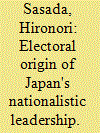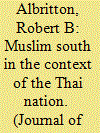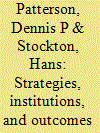|
|
|
Sort Order |
|
|
|
Items / Page
|
|
|
|
|
|
|
| Srl | Item |
| 1 |
ID:
096597


|
|
|
|
|
| Publication |
2010.
|
| Summary/Abstract |
Comparative politics has witnessed periodic debates between proponents of contextually sensitive area studies research and others who view such work as unscientific, noncumulative, or of limited relevance for advancing broader social science knowledge. In Southeast Asia in Political Science: Theory, Region, and Qualitative Analysis, edited by Erik Martinez Kuhonta, Dan Slater, and Tuong Vu, a group of bright, young Southeast Asianists argue that contextually sensitive research in Southeast Asia using qualitative research methods has made fundamental and lasting contributions to comparative politics. They challenge other Southeast Asianists to assert proudly the contributions that their work has made and urge the rest of the comparative politics discipline to take these contributions seriously. This symposium includes four short critical reviews of Southeast Asia in Political Science by political scientists representing diverse scholarly traditions. The reviews address both the methodological and the theoretical orientations of the book and are followed by a response from the editors.
|
|
|
|
|
|
|
|
|
|
|
|
|
|
|
|
| 2 |
ID:
094416


|
|
|
|
|
| Publication |
2010.
|
| Summary/Abstract |
In recent years, some Japanese prime ministers have exhibited a nationalistic tendency, particularly in their foreign policies. The increasing nationalistic appeal by recent leaders marks a sharp contrast with previous leaders, who were unwilling to cause friction with other countries and thus took more centrist positions. More interestingly, those recent leaders, including Koizumi Junichiro, previously adopted a more modest stance. This article seeks to explain the increase in nationalistic appeal, particularly between 2001 and 2006, among Japanese leaders by focusing on some important changes in the Liberal Democratic Party's (LDP's) presidential election procedures. Drawing on the study of US primary elections, I argue that the increase in the weight of rank-and-filers' votes vis-à-vis the LDP Diet members' votes in the LDP presidential election encouraged some candidates to take more ideologically extreme positions. In other words, much like US primaries, the LDP presidential elections can have a tendency to pull some candidates toward extreme positions.
|
|
|
|
|
|
|
|
|
|
|
|
|
|
|
|
| 3 |
ID:
094421


|
|
|
|
|
| Publication |
2010.
|
| Summary/Abstract |
The years since 2004 have been marked by a level of insurgency in the southern region of Thailand unknown for decades. An accurate perspective on this conflict requires a deeper understanding of differences between the Buddhist and Muslim Thais of the region than has been evident in public and academic discourse. This study utilizes data from a survey taken in 2006, of attitudes and political orientations across all regions of Thailand, including an independent sample of the southern region. The data indicate that southerners are different from the rest of Thailand, whether Buddhist or Muslim; that Malay-speaking Muslims are different from other Muslims; and that sympathy for the insurgency lies not in religion, but in defending practices associated with loyalty to specific forms of Malay culture that characterize the region.
|
|
|
|
|
|
|
|
|
|
|
|
|
|
|
|
| 4 |
ID:
094424


|
|
|
|
|
| Publication |
2010.
|
| Summary/Abstract |
Soviet and East European documents provide significant revelations about the interactions of North Korea and its allies. First, they show Pyongyang's longstanding interest in obtaining nuclear technology and probably nuclear weapons. Second, they reveal that North Korea's leadership consistently evaded commitments to allies on nuclear matters-particularly constraints on its nuclear ambitions or even the provision of information. Third, North Korea's words and deeds evoked substantial concerns in Moscow and other communist capitals that Pyongyang, if it obtained nuclear weapons, might use them to blackmail its partners or risk provoking a nuclear war. When aid from the Union of Soviet Socialist Republics was not forthcoming, the Democratic People's Republic of Korea sought to bypass Moscow and obtain assistance from the Kremlin's East European clients and, when that proved fruitless, from Pakistan. The absence of international support reinforced the logic of self-reliance and "military first," pushing North Korea to pursue an independent line with respect to its nuclear weapons. These patterns cannot be extrapolated in a linear way, but they surely suggest reasons for caution by those hoping to engage North Korea in a grand bargain.
|
|
|
|
|
|
|
|
|
|
|
|
|
|
|
|
| 5 |
ID:
094419


|
|
|
|
|
| Publication |
2010.
|
| Summary/Abstract |
During the five democratic elections held in Taiwan from 1992 to 2004 inclusive, the formerly dominant Kuomintang Party (KMT) was temporarily supplanted by the Democratic Progressive Party (DPP) as the nation's largest political party. Most explanations for this have focused on party fragmentation and the changing patterns of electoral competition it helped create. These are important factors, but they have not been tested empirically at the level where candidates won and lost legislative seats, the level of the election district. This article offers such an empirical test, and it will show that these two factors had a direct impact on the ability of DPP and KMT candidates to obtain legislative seats. We also show that these factors carried indirect impacts by hurting the ability of the KMT and DPP to nominate in a way that they would obtain all the seats that their obtained vote shares would allow.
|
|
|
|
|
|
|
|
|
|
|
|
|
|
|
|
| 6 |
ID:
094422


|
|
|
|
|
| Publication |
2010.
|
| Summary/Abstract |
Leading theories of transitions from single-party dominant systems begin with economic crisis, the party's loss of patronage resources, and elite-level defections. The multiparty elections that are then held exert no independent effect, but instead register neutrally the party's decline and the democratization of politics. This article, however, shifts attention from the dominant party to citizens and elections in noncrisis conditions. It argues that citizens assess on key dimensions the dominant party's legitimacy or worthiness of support. Further, where they grow critical of its policy outputs, they scrutinize more closely its conformity to procedures. And as they anticipate that their voting preferences will be thwarted by electoral manipulations, they vote in protest, perhaps producing a "liberalizing electoral outcome." Elections, then, do not simply indicate the dominant party's decline. By deepening alienation, they help citizens to cause it. Analysis is set in Malaysia, long an exemplar of single-party dominance, but recently a case in which the government was dealt a striking electoral setback.
|
|
|
|
|
|
|
|
|
|
|
|
|
|
|
|
|
|
|
|
|